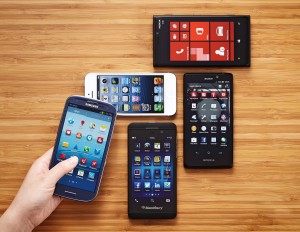Smartphone showdown
With BlackBerry back in contention and Nokia making its presence known in the market, does the iPhone still deserve to be considered the top smartphone?
Advertisement
With BlackBerry back in contention and Nokia making its presence known in the market, does the iPhone still deserve to be considered the top smartphone?
 Smartphone manufacturers have engaged in an all-out battle to win customers. The latest devices feature the longest list of features and functions ever presented in handheld computers.
Nearly all the frontrunners now have large, bright, high-resolution screens. They also sport chipsets capable of running complicated software like media players and immersive games, and feature multiple connectivity options like Wi-Fi, Bluetooth and LTE.
The fight for consumers’ hearts and dollars involves not only industry heavyweights Apple and Samsung, but also companies that market-watchers once placed far behind those two juggernauts: Canada’s own BlackBerry (the company previously known as RIM) and Nokia.
Which is the best of the best? We considered five options: Apple’s iPhone 5, Samsung’s Galaxy S3, the BlackBerry Z10, the Nokia Lumia 920 and the Sony Xperia T. All prices we list are based on signing up for a three-year plan (or no term). You may be surprised to learn which of these worthy contenders deserves to be on top of consumers’ smartphone shopping lists.
Smartphone manufacturers have engaged in an all-out battle to win customers. The latest devices feature the longest list of features and functions ever presented in handheld computers.
Nearly all the frontrunners now have large, bright, high-resolution screens. They also sport chipsets capable of running complicated software like media players and immersive games, and feature multiple connectivity options like Wi-Fi, Bluetooth and LTE.
The fight for consumers’ hearts and dollars involves not only industry heavyweights Apple and Samsung, but also companies that market-watchers once placed far behind those two juggernauts: Canada’s own BlackBerry (the company previously known as RIM) and Nokia.
Which is the best of the best? We considered five options: Apple’s iPhone 5, Samsung’s Galaxy S3, the BlackBerry Z10, the Nokia Lumia 920 and the Sony Xperia T. All prices we list are based on signing up for a three-year plan (or no term). You may be surprised to learn which of these worthy contenders deserves to be on top of consumers’ smartphone shopping lists.
Share this article Share on Facebook Share on Twitter Share on Linkedin Share on Reddit Share on Email